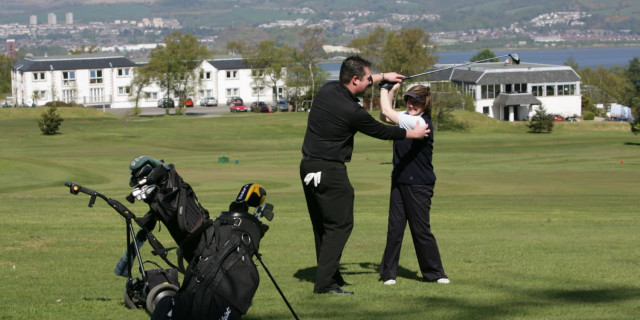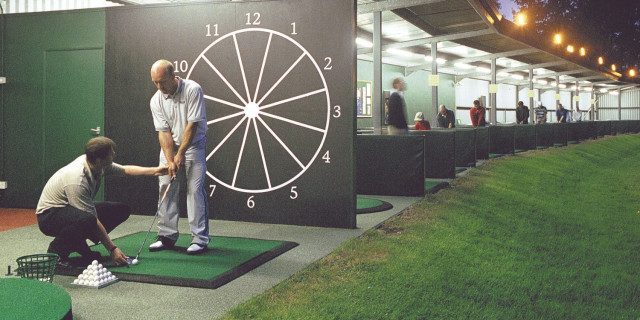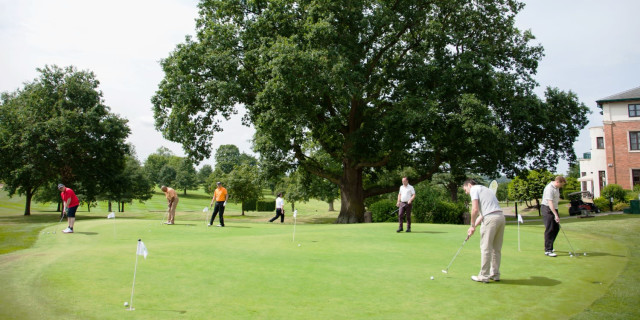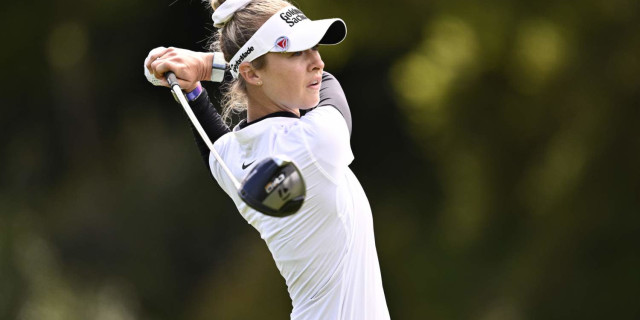
5 Best Tips For Beginner Golfers
Article by Golfshake's Liam Moore
Unravelling your unknown love for golf is something that happens to every golfer only once. You may have been watching professionals and thought, ‘I’d like to do that’; a family member could have taken you to the range for the first time or you and your friends may have decided to take it up together.
While the initial - and there will be an abundance of this - frustration may dominate your earliest experiences with the sport, you will start to improve. The grasp of golf is undeniable - as many of my friends now know! - and getting better doesn’t become something that you desire; it becomes a necessity.
Featured Content
However, the game of golf is complicated, unforgiving, unfair and, as previously noted, downright frustrating at times. While some may not conquer those initial struggles, many do. As a consequence, they become better and further consumed by this wonderfully unique game.
Having started playing two years ago, there have been many things that I wish I knew immediately. Little tips that would have undoubtedly sped up my progression and saved me many sleepless nights wondering how I walked away with a double-bogey when I had a putt for birdie. That right there, is the epitome of golf.
If you’re new to golf, then allow me to share some experiences with you that I think can help bolster your ability and further entice you into getting out onto the golf course as much as possible.
Lessons Vs Equipment

This debate will never die and many believe that the new state of the art driver will take your 18 handicap and splash a bit of magic upon it, quickly transitioning it to single figures. Sadly, that won’t happen - ever. All the gear and no idea has a certain truth to it, one might argue…
While modern equipment has accelerated in helpful technology, it won’t solve long-term issues. Sure, you might get a few extra yards from the tee or the face might offer a touch more forgiveness, but if your swing plane is wrong, regardless of club, new equipment won’t provide a hasty remedy for that.
You know what will though? A trip to your local pro. If we’re basing it purely off cost too, you’ll roughly obtain ten hours of tuition for the price of a modern driver. Within those ten hours, you will be provided a platform for you to improve on - greatly at that, too.
Rarely do amateurs have everything firing - driving, iron play, wedge play, chipping, putting - after all, there’s a lot of segments of an overall golf game. By purchasing lessons, you’ll be given expertise around all of these areas. I’d like to see some of you pitch that expensive driver onto the green from 60 yards out…
However, obtaining new clubs is exciting but believe me, it’s not necessary for beginners. Once you start to improve, then you’ll benefit from the latest technology and you’ll see those scores lowered. Until then, undergo lessons and ask a professional how on earth this game should be played? You won’t regret it.
You’re Not A Professional

This might damage your ego a little bit, but we’re not professionals. It’s unlikely we are going to dial in a 5-iron from 180 yards to sit pin high with a 4-foot putt for birdie. Of course, it’s possible and it may even happen once or twice a year, but generally, it’s just not plausible.
When out on the course, relax. Are things going wrong? If so, have a little chuckle about it. Can’t sink a putt for money? Don’t worry, there’s always next time. Some wonderful advice I was given by my father-in-law was that we pay to play the game of golf, not the other way round. Is it productive to pay for frustration? Absolutely not.
You’re going to get good days and bad days and, quite simply, there is nothing that you can about that. How often do we see PGA Tour professionals +10 on their front nine? If it happens to the elite, then you can bet it’s going to happen to every single amateur from time to time. That’s golf and that’s what makes the sport so infuriatingly beautiful.
Within the space of seven days, playing the exact same course, I dropped 20 shots. Twenty. No reason whatsoever other than it being a bad day at the office. The irony is I started that round with the highest level of confidence I think I ever held. Allow this to be a stark reminder that golf will always bite back, always.
Practice, Practice, Practice

Dependent on the stage of life you are currently at, practicing as much as possible may be completely removed from the equation. If that is the case, when you do get time to practice, I urge you to use that time efficiently. Hitting balls aimlessly on the range might be a good pastime, but it won’t necessarily improve you.
Think of the range as if it’s one of the holes on the course and play it like that. Driver into the fairway then an iron into the green. By hitting the same club continuously - I too am susceptible to this occasionally - becomes mind numbing and counterproductive. You won’t do that on the course, so why here?
If you do have ample time for practice sessions, however, then mix things up. While the range is obviously a fantastic facility to improve, chipping and putting greens are just as valuable. Truth be told, it is an amateur’s short game that lets them down, so it’s only right that you dedicate more time to improve on areas of your game that aren’t quite up to scratch - excuse the pun.
If you typically hit 100 balls on the range, why not purchase 50 and then use the remainder of the allocated time to practice chipping and putting. The fundamentals of chipping may be basic, but it takes a long time to understand touch/feel and how your wedges will perform around the green.
While nothing beats playing golf on the course, by improving, those rounds will become even sweeter. It may not be as fun as playing 18, but by delegating time to practice sessions, you’ll soon reap the rewards on the course and thus, further bolster your enjoyment from the sport.
Putting - More Important Than You Think

I’ve had the honour of interviewing a few touring professionals recently and understanding how they approach the game has been fascinating. When I asked them for their tips for amateur improvement, they both noted the same area: putting.
To be specific, pace putting. If you can control the pace of your putts, you’ll quickly eliminate those needless three putts. Of course, it’s impossible to fully eradicate every three-putt, but you will see a drastic improvement by spending time on pace control.
While green reading is an art and something that is developed over years of playing the game, pace putting is something that can be improved much quicker. It falls into the previous category and practicing; you must spend time on the putting green - you’ll be surprised how fewer putts can also inject confidence throughout your entire game.
If you’re struggling with putting, don’t spend too much time on the line and potential break of the putt. Think of a large circular vicinity around the hole, roughly five times the size of the actual hole, and aim to get your putt inside of that. It will subsequently make your second putt much easier and hopefully you’ll be walking off with a par/bogey at worst.
When you are content with your ability to read the pace of putts, that’s when you can branch off into green reading and understanding how much break to account for. Until then, focus on removing three putts from your game as much as possible.
Mindset

Mindset completely dominates the sport of golf. You cannot have any negative thoughts as you stand over the ball or, even worse, as you are into the action of the swing. There have been times where I am at the top of my swing and I thought: ‘this is missing right’, and surprise, surprise, it did.
I only truly started to improve when I began to dial back my mindset and started to enjoy the challenge that golf truly is. If I hit a bad shot now, I allow five seconds of contemplation - and internal screaming - before it’s gone. You’re not going to get that shot back, so why take it with you to the next one?
I’m in a fortunate position where I get to typically play golf twice a week. So, if I’m playing poorly, what helps me is a little reminder to myself that I’ll be able to rectify these issues in a few days. The irony is, it feels that I am reminding myself of this every single round! Nevertheless, I have not only improved through it, but I feel I gain further enjoyment from the game. Ultimately, we all play golf to enjoy ourselves, right?
If you can master your mindset, then anything is possible. If you can laugh off bad shots or even bad rounds, you’ll see radical improvement. If you’re development is growing, then you’ll enjoy the sport more. It truly is an endless cycle.
If you’re new to the game of golf, welcome. You’ll seldom find a better hobby than this beautiful activity. Remember, golf is really hard - that’s what makes it so rewarding! As you begin your development, the results will entice you back more and more.
Regardless of your current ability, the topics that we spoke about today will undoubtedly improve your skill and enjoyment from the sport. Lessons will always reign over the latest equipment; continue to practice as much as feasibly possible; if you can reduce your putts, your entire game will improve around it; your mindset is your best friend and your biggest enemy and finally, you’re not, nor will you ever be, professional - so relax and play the sport of golf for its sole purpose, enjoyment.
Discover Golfshake's Tuition Section!
Tags: Tuition Tips GOLFERS daily picks









